Introduction
On April 21, 2021, Australian Foreign Minister Marise Payne announced that Canberra had revoked two major accords between the Australian State of Victoria and China, effectively terminating Australia's limited participation in China's Belt and Road Initiative (BRI).[1]
In a press release, Payne pointed to a Memorandum of Understanding (MoU) between the Government of Victoria and China's National Development and Reform Commission on Cooperation within the "Framework of the Silk Road Economic Belt and the 21st Century Maritime Silk Road Initiative," signed October 8, 2018. He also noted the Framework Agreement" between the Government of Victoria and China's National Development and Reform Commission of the People's Republic of China on "Jointly Promoting the Framework of the Silk Road Economic Belt and the 21st Century Maritime Silk Road," signed a year later, on October 23, 2019.[2]
Australia's formal revocation of Victoria's participation in the BRI was enabled by new powers afforded to the federal government under the Foreign Arrangements Scheme legislation passed in December 2020. Under this legislation, the foreign minister may veto deals between foreign countries and subnational authorities, such as state governments, local councils, and publicly funded universities.[3] In addition to the cancellation of Victoria's MoU and Framework Agreement with China, Payne also terminated two of Victoria's longstanding agreements with Syria and Iran.[4]
Citing the Foreign Arrangements Scheme, Payne explained that the accords between the government of Victoria and China were "inconsistent with Australia's foreign policy or adverse to our foreign relations."[5]
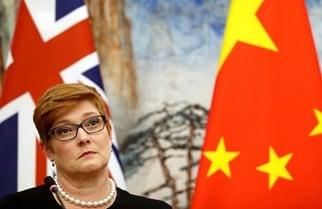
Australian Foreign Minister Marise Payne (Source: Facebook)
Victoria-China Partnership
In 2018, Victoria Premier Daniel Andrews signed a four-page MoU with China, stating that the two parties would "work together within the Belt and Road Initiative." The agreement added that "based on existing cooperation, the Parties will enhance policy cooperation, facilities connectivity, unimpeded trade, financial cooperation, people-to-people bond, and promote Digital Silkroad Cooperation."[6]
The following year, in April 2019, Andrews paid an official visit to Beijing and Nanjing – his fifth visit to China in five years – "to represent Victoria as the only Australian subnational leader at the Belt and Road Forum for International Cooperation (BRF) in Beijing," and to launch the 40th anniversary celebrations with Victoria's sister-state Jiangsu.[7] Later that year, in October, Andrews signed a Framework Agreement with China's National Development and Reform Commission.[8] Praising the agreement, Andrews stated: "Victoria is proud of its longstanding and valued partnership with China and this new Framework Agreement helps take it to the next level."[9] He also stressed: "We don't see China as our good customers, we see them as our good friends"[10] – a clear criticism of Australian Prime Minister Scott Morrison, who had, just before the 2019 election, referred to the U.S. as a "friend" and to China as a "customer."[11]
It is worth noting that at that time, Andrews' actions were widely criticized in Australia as breaking ranks and overstepping the remit of the state, since international trade is generally understood to fall within the purview of the Australian federal government. Commenting on the agreements, Australian Strategic Policy Institute executive director Peter Jennings said: "I think it was extremely unwise for the Victorians to do this, because they're really involving themselves in areas that constitutionally are the responsibility of the Federal Government."[12]
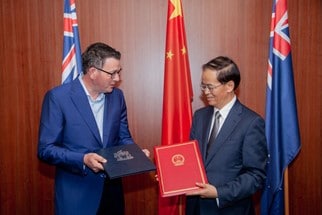
Victorian Premier Daniel Andrews and Chinese Ambassador to Australia Cheng Jingye. (Source: Abc.net.au)
Chinese Embassy In Australia: 'This Is Another Unreasonable And Provocative Move'
The revocation of the two Victoria accords prompted a heated response from the Chinese government. In a statement, the Chinese Embassy in Australia decried it as yet "another unreasonable and provocative move taken by the Australian side against China."[13] Its April 21 statement on the matter read: "We express our strong displeasure and resolute opposition to the Australian Foreign Minister's announcement on April 21 to cancel the Memorandum of Understanding on Cooperation within the Framework of the Belt and Road Initiative and the related Framework Agreement between the Chinese side and Government of Victoria.
"The BRI is an initiative for economic cooperation, which follows the principle of extensive consultation, joint contribution and shared benefits, and upholds the spirit of openness, inclusiveness and transparency. It has brought tangible benefits to the participating parties. The BRI cooperation between China and the Victoria state is conducive to deepening economic and trade relations between the two sides, and will promote economic growth and the well-being of the people of Victoria.
"This is another unreasonable and provocative move taken by the Australian side against China. It further shows that the Australian government has no sincerity in improving China-Australia relations. It is bound to bring further damage to bilateral relations, and will only end up hurting itself."[14]
It is worth noting that on November 18, 2020, the Chinese Embassy in Australia leaked an extraordinarily blunt dossier enumerating 14 grievances that purportedly implicate Australia in "poisoning the atmosphere of bilateral relations." In addition to protestations against Australia's decision to block specific Chinese investment projects and to ban Chinese telecoms from building Australia's 5G network, the dossier scorned Australia's current stance on issues relating to Xinjiang, Hong Kong, Taiwan, and the South China Sea, deriding it as "incessant wanton interference." Shortly after the list became public, Australian Prime Minister Scott Morrison responded by reaffirming that "Australia can never compromise on our national interests."[15]
China's No. 2 Diplomat in Australia: 'China is Not a Cow;' 'We Believe There Will Be Always A Nirvana After A Major Crisis'
In an April 21 presentation at the National Press Club of Australia, the deputy Head of Mission and Minister at the Chinese Embassy in Australia, Wang Xining, touched on the deterioration of Sino-Australian relations.[16] In his talk, he stated that it is particularly important "at this moment" for Australia to have "a truthful, objective and sophisticated understanding" of China. He added that China and Australia "benefitted from a growing relationship," "strong political interlocution," and a "thriving economic partnership." "There were ups and down and there were issues, and if handled properly this up-ticking trajectory of our relationship will serve the interest of both peoples," he stated.
In a blunt metaphor and thinly veiled warning to anti-CCP elements in the Australian government, Wang said: "According to the Chinese lunar calendar [this] year [is the Year] of the Ox... We Chinese love to present ourselves, to describe ourselves, as hardworking cattle, like the ox, and of course we'd like to share our yoke with all partners to plow through the difficulties caused by COVID-19, and sail through this trying time. But at the same time China is not a cow, I don't think anybody should fancy the idea to milk her when she's in prime and plot to slaughter [her] in the end. So, we are open for collaboration and cooperation, but will be very strong in defending our national interest."
He also asserted: "Winston Churchill once said never [to] let a good crisis go to waste, and we believe... because the Chinese interpretation of the word 'crisis' means both peril and opportunities... there will be always a Nirvana after a major crisis, and we hope to see a Nirvana of the global economy, of people's welfare, and also of our relationship."
Wang concluded with an unusual allusion to German composer Richard Wagner's epic music drama "Der Ring des Nibelungen," comparing contemporary Sino-Australian tensions to the actions of the two leading characters Siegfried and Brunhild: "I'm a big fan of opera, so I remember when Brunhild jumped into the pyre that incinerated Siegfried, their love and their relationship were elevated to a new level... Don't be afraid of the fire and the cauldron. We will handle it well. If we [can] handle it well, we'll elevate everything to another level."
It should be noted that Wang did not offer any suggestions for how the two nations could "elevate" their relationship to "another level."
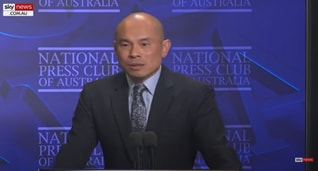
Deputy Head of Mission and Minister at the Embassy of the PRC in Australia, Wang Xining, addresses the National Press Club of Australia on April 21, 2021 (Source: SkyNews.com.au )
Chinese Foreign Ministry Spokesman Wang Wenbin: 'Australia Is Telling Others To Take The Medicine – When It Is Sick Itself'
At a regular press conference on April 22, 2021, Chinese Foreign Ministry Spokesman Wang Wenbin accused the Australian federal government of "wantonly disrupting normal exchanges and cooperation between the two countries."[17] He said: "The Victoria State's decision to cooperate with China under the BRI framework to improve the wellbeing of both peoples is a good thing that could have brought benefits to both sides. The Australian federal government vetoed the BRI cooperation agreements between the government of Victoria and China for no good reason, wantonly disrupting normal exchanges and cooperation between the two countries and gravely undermining the bilateral relations and mutual trust. China expresses strong dissatisfaction and firm opposition and has already lodged solemn representation with the Australian side. China reserves the right to make further reactions over this matter."
He continued: "We urge Australia to set aside cold war mentality and ideological bias, view the bilateral cooperation in an objective and rational light, immediately redress mistakes and change course, refrain from going down the wrong path further, and avoid making the already seriously difficult China-Australia relations worse."[18]
At another press conference, on April 27, Wenbin further elaborated on China-Australia bilateral tensions, stating that the problems arising between the two countries stem from Australia "grossly" interfering in China's domestic affairs: "China always believes that sound and stable China-Australia relations serve the fundamental interests of both peoples. The root cause of the severe difficulties in bilateral relations is that Australia grossly interferes in China's domestic affairs, hurts China's interests and adopts discriminatory trade practices against China. None of the responsibility rests with China. The Australian side used the word 'authoritarian' to describe China, but it was among the first to ban Chinese companies from its 5G rollout. It has also vetoed time and again Chinese investments under the pretext of 'national security' and wantonly searched Chinese journalists in Australia. It accused China of undermining the rules, but again it blatantly torn up cooperative deals with China and disrupted bilateral exchange and cooperation."
Labelling Australia "sick," he concluded: "Basically, Australia is telling others to take the medicine when it is sick itself. How can this solve the problem? We hope Australia will look at China and China's development in an objective and rational light and work to build mutual trust and facilitate practical cooperation instead of going further down the wrong path."[19]
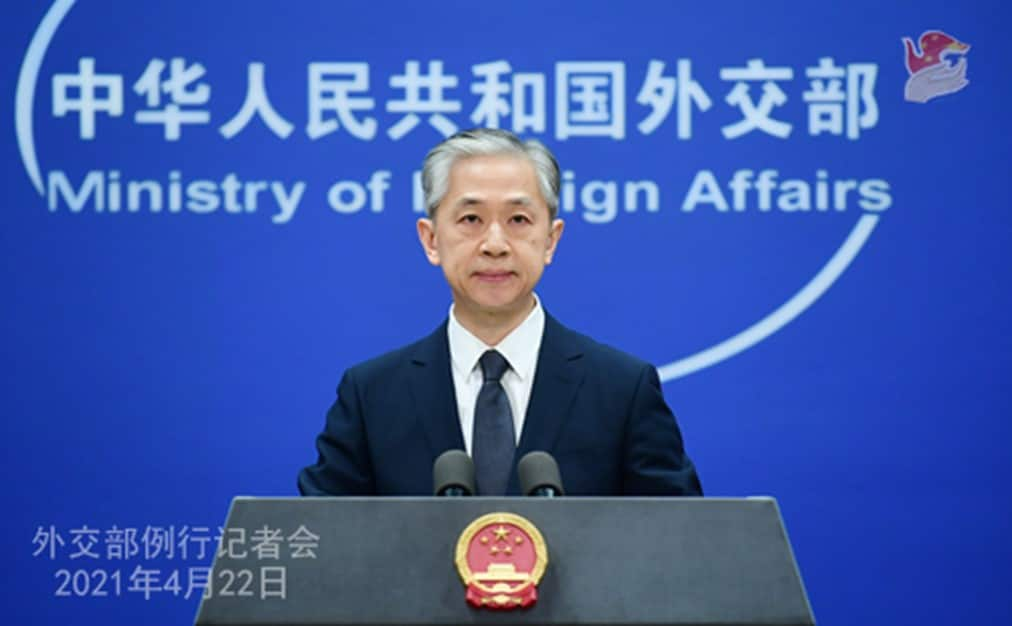
Chinese Foreign Ministry Spokesperson Wang Wenbin (Source: Fmprc.gov.cn)
On Social Media: Such 'Treachery Can Only Be Expected From Descendants Of Convicted Criminals'
Chinese Communist Party-affiliated accounts and nationalist Chinese users took to social media to express their views of the Australian government. Within a few days, the hashtag "#China responds to Australia's tearing-up of the Belt and Road Agreement" (#中方回应澳方撕毁一带一路协议) had garnered over 280 million views on the Chinese microblogging platform Sina Weibo.[20]
Short videos explaining the Australian government's move proliferated across Chinese video websites, often with anti-Australia titles such as "Provocation will pay the price! Australia insists on tearing up the Belt and Road Agreement, China solemnly warns."[21]
It was also noted that the most common description of the cancellation of the deals by nationalist Chinese users was that this "violated the spirit of a contract." Some wrote that "such perfidy" and "treachery can only be expected from descendants of convicted criminals."[22]
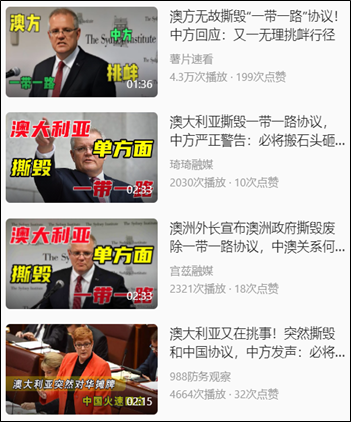
Australia's cancellation of the BRI sparks proliferation of anti-Australia videos on Chinese site (Source: Haokan)
Conclusion
Between the formal condemnation by Chinese officials and the concurrent online criticism of Australia, public opinion in China is likely to be galvanized to believe that the deterioration in Sino-Australia relations is Australia's fault, and that any punitive measures from China are therefore justified.
While this incident represents the latest salvo in the acrimonious relationship, the fallout has so far remained predominately rhetorical. However, it would be unsurprising if China were to continue its longstanding pattern by levelling additional sanctions or other punitive measures against Australian exports, in an attempt to coerce Australia into pursuing a pro-CCP foreign policy. [23]
Meanwhile, Foreign Minister Payne said that the ministry had reviewed over 1,000 arrangements between foreign countries and sub-national authorities, and promised to examine all future arrangements that fall within the remit of this law. While she has not yet hinted at any other arrangements that are likely to be cancelled, Australian politicians and Chinese news media have speculated about likely contenders. The Chinese state-owned Phoenix Media news outlet suggested that Australia may move to cancel agreements between publicly funded Australian universities and Confucius Institutes,[24] while former Australian prime minister Kevin Rudd recommended that Australia revaluate its 99-year lease of the Port of Darwin to the Chinese-owned Landbridge company.[25]
* Heath Sloane is a Research Fellow for the MEMRI Chinese Media Studies Project.
[1] Foreignminister.gov.au/minister/marise-payne/media-release/decisions-under-australias-foreign-arrangements-scheme, April 21, 2021.
[2] Foreignminister.gov.au/minister/marise-payne/media-release/decisions-under-australias-foreign-arrangements-scheme, April 21, 2021.
[3] Foreignarrangements.gov.au/about-the-scheme/what-does-the-scheme-do
[4] The two agreements with Iran and Syria were the MoU between the Department of Education and Training (Victoria) and the Technical and Vocational Training Organisation, Ministry of Labour and Social Affairs, and the Islamic Republic of Iran, signed in November 2004, and the Protocol of Scientific Cooperation between the Ministry of Higher Education in the Syrian Arab Republic and the Ministry of Tertiary Education and Training of Victoria, signed in March 1999. Foreignminister.gov.au/minister/marise-payne/media-release/decisions-under-australias-foreign-arrangements-scheme, April 21, 2021.
[5] Foreignminister.gov.au/minister/marise-payne/media-release/decisions-under-australias-foreign-arrangements-scheme, April 21, 2021.
[6] Abc.net.au/news/2018-11-12/victoria-china-belt-and-road-infrastructure-agreement-released/10487034, November 12, 2018.
[7] Vic.gov.au/dpc-travel-outcomes-report-daniel-andrews-2019-travel-china, April 2019.
[8] Premier.vic.gov.au/victoria-and-china-take-partnership-next-level, October 23, 2019.
[9] Premier.vic.gov.au/victoria-and-china-take-partnership-next-level, October 23, 2019.
[10] Premier.vic.gov.au/victoria-and-china-take-partnership-next-level, October 23, 2019.
[11] Sbs.com.au/news/china-customers-us-friends-morrison, May 13, 2019.
[12] Abc.net.au/news/2018-11-12/victoria-china-belt-and-road-infrastructure-agreement-released/10487034, November 12, 2018.
[13] Au.china-embassy.org/eng/sghdxwfb_1/t1870484.htm, April 21, 2021.
[14] Au.china-embassy.org/eng/sghdxwfb_1/t1870484.htm, April 21, 2021.
[15] See MEMRI Inquiry and Analysis No. 1538, The China-Australia Crisis From China's Perspective, November 25, 2021.
[16] Youtube.com/watch?v=byRMMPpTrf8&ab_channel=SkyNewsAustralia, April 21, 2021.
[17] Fmprc.gov.cn/mfa_eng/xwfw_665399/s2510_665401/2511_665403/t1870792.shtml, April 22, 2021.
[18] Fmprc.gov.cn/mfa_eng/xwfw_665399/s2510_665401/2511_665403/t1870792.shtml, April 22, 2021.
[19] Id.china-embassy.org/eng/fyrth/t1871998.htm, April 27, 2021.
[20] S.weibo.com/weibo/%25E6%25BE%25B3%25E5%25A4%25A7%25E5%2588%25A9%25E4%25BA%259A?topnav=1&wvr=6&b=1
[21] Haokan.baidu.com/v?vid=5705141948573707930&pd=bjh&fr=bjhauthor&type=video
[22] Scmp.com/week-asia/opinion/article/3130685/australias-move-scrap-bri-deal-chinese-netizens-its-canberra-who, April 23, 2021.
[23] See MEMRI Inquiry and Analysis No. 1540, Australian Wine Becomes Latest Casualty In China's Trade War Against Australia, December 1, 2020.
[24] News.ifeng.com/c/85myrdQw2iJ, April 27, 2021.
[25] Abc.net.au/news/2021-04-27/nt-kevin-rudd-darwin-port-lease/100097678, April 27, 2021.








